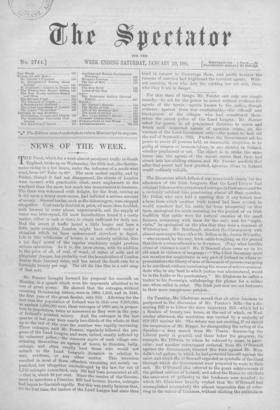Mr. Forster brought forward his proposal for coercion on Monday,
in a speech which even his opponents admitted to be one of great power. He showed that the outrages, without counting threatening letters, were in 1880, 1,253, and in 1845, the first year of the great famine, only 950. Allowing for the fact that the population of Ireland was in 1845 over 8,000,000, as against 5,000,000 now, these outrages of 1880 are, in propor- tion to population, twice as numerous as they were in the year of Ireland's greatest misery. And the outrages in the last quarter of last year were nearly two-thirds of the whole, so that up to the end of the year the number was rapidly increasing. These outrages, said Mr. Forster, regularly followed the pro- gress of the Land League, and were, indeed, mostly inflicted by its volunteer police,—the mauvaie svjets of each village con- stituting themselves an agency of terror, to threaten, bully, outrage, and often cruelly hurt those who would not submit tothe Land League's dictation in relation to rent, evictions, or any other matter. This terrorism resulted in most of these offenders remaining not merely un- punished, but altogether unchallenged by the law, for out of 1,153 outrages committed, only 182 had been prosecuted at all, —that is, about 16 per cent. Since the resolve of the Govern- ment to introduce a Coercion Bill had become known, outrages had begun to diminish rapidly. But this was partly because that, for the first time, the leaders of the Land League had since then tried in earnest to discourage them, and partly because the rumour of coercion had frightened the terrorist agents. With- out coercion, those who defy the existing law are safe, those who obey it are iu danger.






































